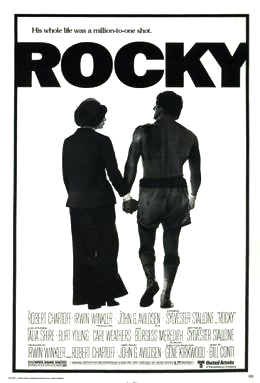
Rocky is a 1976 American sports drama film directed by John G. Avildsen and written by and starring Sylvester Stallone. It is the first installment in the Rocky franchise and also stars Talia Shire, Burt Young, Carl Weathers, and Burgess Meredith. In the film, Rocky Balboa (Stallone), a poor small-time club fighter and loanshark debt collector from Philadelphia, gets an unlikely shot at the world heavyweight championship held by Apollo Creed (Weathers).

Sylvester Gardenzio Stallone is an American actor and filmmaker. He has received numerous accolades, including a Golden Globe Award and a Critics' Choice Award, as well as nominations for three Academy Awards and two BAFTA Awards. Stallone is one of only two actors in history to have starred in a box-office No. 1 film across six consecutive decades.
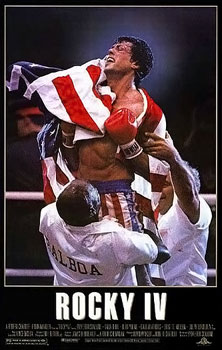
Rocky IV is a 1985 American sports drama film written, directed by, and starring Sylvester Stallone. The film is the sequel to Rocky III (1982) and the fourth installment in the Rocky film series. It also stars Talia Shire, Burt Young, Carl Weathers, Brigitte Nielsen, and Dolph Lundgren. In the film, Rocky Balboa (Stallone) confronts Ivan Drago (Lundgren), a Soviet boxer responsible for a personal tragedy in Balboa's life.

Rocky II is a 1979 American sports drama film written, directed by, and starring Sylvester Stallone. The film is the sequel to Rocky (1976) and the second installment in the Rocky film series. It also stars Talia Shire, Burt Young, Carl Weathers, and Burgess Meredith. In the film, Rocky Balboa (Stallone), struggling to adjust to his newfound fame and family life, finds himself in a rematch fiercely demanded by Apollo Creed (Weathers).
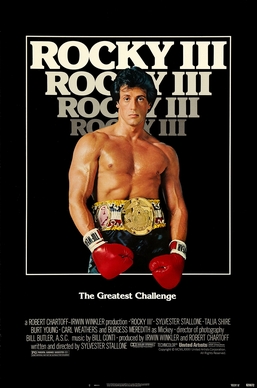
Rocky III is a 1982 American sports drama film written, directed by, and starring Sylvester Stallone. The film is the sequel to Rocky II (1979) and the third installment in the Rocky film series. It also stars Talia Shire, Burt Young, Carl Weathers, and Burgess Meredith. In the film, Rocky Balboa (Stallone) faces stiff competition from Clubber Lang, a powerful new contender, and turns to his old adversary Apollo Creed (Weathers) to help him train.

Rocky V is a 1990 American sports drama film directed by John G. Avildsen and written by and starring Sylvester Stallone. It is the sequel to Rocky IV (1985) and the fifth installment in the Rocky film series. It also stars Talia Shire, Burt Young, Sage Stallone in his film debut, Tommy Morrison, and Burgess Meredith. In the film, a financially struggling Rocky Balboa (Stallone) agrees to train protégé Tommy Gunn (Morrison) at the gym once owned by Balboa's trainer, Mickey Goldmill (Meredith).

Cobra is a 1986 American action film directed by George P. Cosmatos and written by Sylvester Stallone, who also stars in the titular role. The film co-stars Reni Santoni, Brigitte Nielsen and Andrew Robinson. Loosely based on the novel A Running Duck by Paula Gosling, Cobra follows police detective Marion "Cobra" Cobretti as he investigates a string of violent crimes while also protecting a witness targeted by the perpetrators.
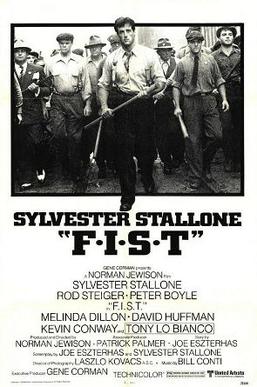
F.I.S.T. is a 1978 American neo-noir crime drama film produced and directed by Norman Jewison and starring Sylvester Stallone. Stallone plays a Cleveland warehouse worker who becomes involved in the labor union leadership of the fictional "Federation of Inter-State Truckers" (F.I.S.T.). The film is loosely based on the Teamsters Union and their former President Jimmy Hoffa. The screenplay was by Joe Eszterhas and Stallone, from a story by Eszterhas.

Frank Stallone Jr. is an American actor and musician. He is the younger brother of actor Sylvester Stallone and has written music for Sylvester's movies. His song "Far from Over" appeared in the 1983 film Staying Alive and was included on the film's soundtrack album. The song reached number ten on the US Billboard Hot 100 chart and received a Golden Globe nomination for Stallone, while the album itself, consisting of Stallone and various other artists, received a Grammy nomination.

Over the Top is a 1987 American sports drama film starring Sylvester Stallone. It was produced and directed by Menahem Golan, and its screenplay was written by Stirling Silliphant and Stallone. The original music score was composed by Giorgio Moroder. The main character, Lincoln Hawk, played by Stallone, is a long-haul truck driver who tries to win back his estranged son, Michael, while becoming a champion arm wrestler.

No Holds Barred is a 1989 American action film produced by Michael Rachmil, directed by Thomas J. Wright, written by Dennis Hackin and starring professional wrestler Hulk Hogan. It is owned by WWE under a "Shane Distribution Company" copyright and was released by New Line Cinema on June 2, 1989. Released seven years after his appearance in Rocky III, it was Hogan's first starring role.
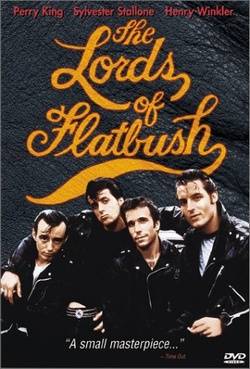
The Lords of Flatbush is a 1974 American drama film directed by Martin Davidson and Stephen F. Verona. The film stars Sylvester Stallone, Perry King, Paul Mace and Henry Winkler. Stallone was also credited with writing additional dialogue. The plot is about street teenagers in leather jackets from the Flatbush neighborhood of Brooklyn, New York. The movie, along with the television hit Happy Days, the musical Grease and its like-named film version, and novelty rock act “Sha Na Na’’, was part of a resurgence in popular interest in the '50s greaser culture in the 1970s.
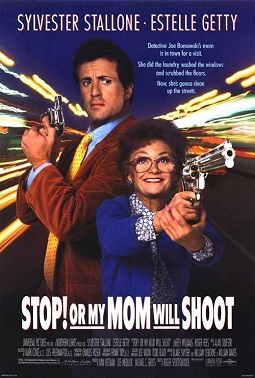
Stop! Or My Mom Will Shoot is a 1992 American buddy cop action comedy directed by Roger Spottiswoode and starring Sylvester Stallone and Estelle Getty. The film was released in the United States on February 21, 1992. The film received highly negative reviews upon release but grossed $70.6 million worldwide.

Oscar is a 1991 American comedy film directed by John Landis. Based on the Claude Magnier stage play, it is a remake of the 1967 French film of the same name, but set in Depression-era New York City. Oscar stars Sylvester Stallone, in a rare comedic role, as Angelo "Snaps" Provolone, a mob boss who promises his dying father that he will leave the world of crime and become an honest businessman. Alongside Stallone, the film's cast includes Marisa Tomei, Ornella Muti, Tim Curry and Chazz Palminteri. Its score was composed by Elmer Bernstein.
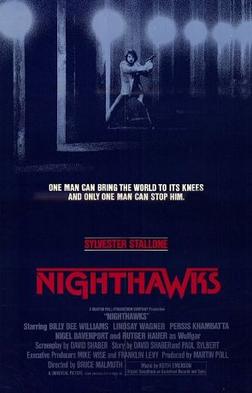
Nighthawks is a 1981 American neo-noir action crime thriller film directed by Bruce Malmuth and starring Sylvester Stallone with Billy Dee Williams, Lindsay Wagner, Persis Khambatta, Nigel Davenport, and Rutger Hauer. Its score was composed by Keith Emerson. The film was noted for production problems.

Rocky Balboa is a 2006 American sports drama film written, directed by, and starring Sylvester Stallone. It is the sequel to Rocky V (1990) and the sixth installment in the Rocky film series. It also stars Burt Young and Antonio Tarver in his only acting role. In the film, Rocky Balboa (Stallone), now an aging small restaurant owner, is challenged to an exhibition fight by hothead young boxer Mason Dixon (Tarver).
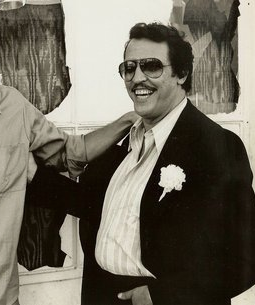
Joe Spinell was an American character actor who appeared in films in the 1970s and 1980s, as well as various stage productions on and off Broadway. He played supporting roles in film including The Godfather (1972) and The Godfather Part II (1974), Rocky (1976), Rocky II (1979), Taxi Driver (1976), Sorcerer (1977) and Cruising (1980).

Creed is a 2015 American sports drama film directed by Ryan Coogler, who co-wrote the screenplay with Aaron Covington. It is the first spin-off of and is the seventh installment in the Rocky film series. It stars Michael B. Jordan, Sylvester Stallone, Tessa Thompson, Phylicia Rashad, Tony Bellew, and Graham McTavish. In the film, amateur boxer Adonis Creed (Jordan) is trained and mentored by Rocky Balboa (Stallone), the former rival turned friend of Adonis' father, Apollo Creed.
Joyce Elaine Ingalls was an American actress and model, best known for her roles in Paradise Alley in 1978 and Lethal Weapon 4 in 1998. She also had a guest role in the television series Starsky and Hutch in 1979, as the mutual love interest of both main characters.

Chuck is a 2016 American biographical sports drama film directed by Philippe Falardeau and written by Jeff Feuerzeig, Jerry Stahl, Michael Cristofer and Liev Schreiber, who also stars in the title role. The cast includes Elisabeth Moss, Ron Perlman, Naomi Watts, Jim Gaffigan, Michael Rapaport, Pooch Hall, Morgan Spector, Jason Jones and Catherine Corcoran. The film depicts the life of heavyweight boxer Chuck Wepner and his 1975 title fight with the heavyweight champion, Muhammad Ali, which inspired Sylvester Stallone's character and screenplay for the 1976 film Rocky.



















